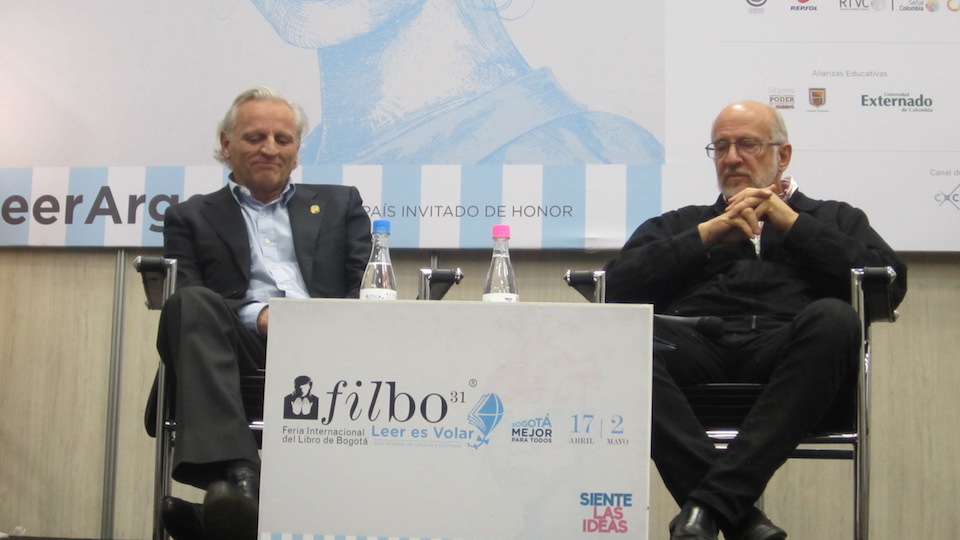
Alex Grijelmo García (left) and Daniel Samper Pizano (right)
Leading journalists Daniel Samper Pizano and Álex Grijelmo discuss the English invasion of the Spanish language.
Journalists Daniel Samper Pizano and Álex Grijelmo García met last night at FILBo not only to discuss Spanish, but also to start a front in the defence against the English words that are invading hispanophone media and advertising.
Samper Pizano, with his irrefutable wit for puns, and Grijelmo García – former Agencia EFE president- held a conversation about what the latter calls the genie of the language. As an introduction to the conversation, Samper Pizano started by asking him about the use of the word conversatorio to designate the event we are at; Grijelmo said the torio part of a word designates a place (dormitorio, sanatorio, oratorio are other examples), then stating its use would not be correct to characterize the conversation but the venue.
Samper Pizano remembered Grijelmo’s speech and asked him about the reasons behind his phrase “Spanish is the work of a marvellous genie”. Grijelmo said this genie is “a being that has taken possession of all of us: speakers of the language, for us to follow his instructions, to generate new words (even without realising it), to have us make decisions about its use .” We can see very easily the work of the genie at play when kids make inferences about how a verb should be conjugated. Grijelmo concludes we are genetically-linguistic beings.
This language genie is also slow. Some decisions about the way language is used today were only made after a long process (centuries in many cases). Grijelmo cites the case of the word auro which is our overrated oro (gold) nowadays, farina became harina (four). Grijelmo says that “slow revolutions are the best revolutions”. Believe or not, among other characteristics, the genie is simple; it rejects complexity, long words. He jokingly closes his remark by saying “the genie tends towards simplicity; it is politicians who tend to the contrary”.
Related: All our FILBo 2018 coverage
Further in the conversation, Grijelmo also pointed to the fact that the Diccionario de la Real Academia Española will now be the Diccionario de la Lengua Española (The Dictionary of the Spanish Language) as it is the result of all the collaborations of all the Academies. This means that Colombianisms, Americanisms and so forth will now be included. “Spanish of yore thought they owned the language; Spain amounts only to 10% of the speakers of Spanish, we do not own anything; this is fundamentally a [Latin] American language, and it is here in the Americas where the greatest wealth of words is being produced.”
On the question of whether he sees Spanish varieties being fragmented in the future, he says it is very difficult because “our language has so many institutions to regulate it – Agencia EFE, Fundeu, the Academia Real – but also because we speakers, are interested in maintaining that unit; we, for example, want a message posted in social networks being understood from end to end, from Chile to Mexico.”
Related: Get the best out of FILBo 2018
Samper Pizano also referred to the general belief that Spanish does not have accurate words to name colour hues or the sounds animals make. We simply have not used them in a long time but they do exist and it is our duty to bring them back to life, which took Samper Pizano to his language crusade, in his words, “the disease of English words being used in Spanish.”
Samper Pizano clarifies that he can accept the use of English words when there is no equivalent, or their adaptation into Spanish. His crusade has more to do with the use of words in English with the sole purpose of making something sound more prestigious or worthwhile. He also proudly told the audience of a little battle he won at the publishing house he works for: he had them change the Me gusta leer club construction for the more correct version in Spanish Club me gusta leer.
Samper got smiles from the audience with some examples of English words in Spanish ads and news: Black Friday (which could perfectly be called Viernes negro), street art (arte callejero), foodie (gastrónomo) among others. “It is not our fault – he says – it is the journalists fault [for using these words to make it sound more prestigious].”
Grijelmo added to the discussion saying that “we think English is a superior language. It definitely dominates technology, but it is not a superior culture. No culture is superior. When we use English [words in Spanish] we do so because of an inferiority complex; using words in English makes us feel important (…) that also has a connection with the economy. A dentist who charges to fix your ‘brackets’ gets to charge more than if he fixes your frenillo. Things such as this should not happen to a culture as rich as the Spanish culture.”





